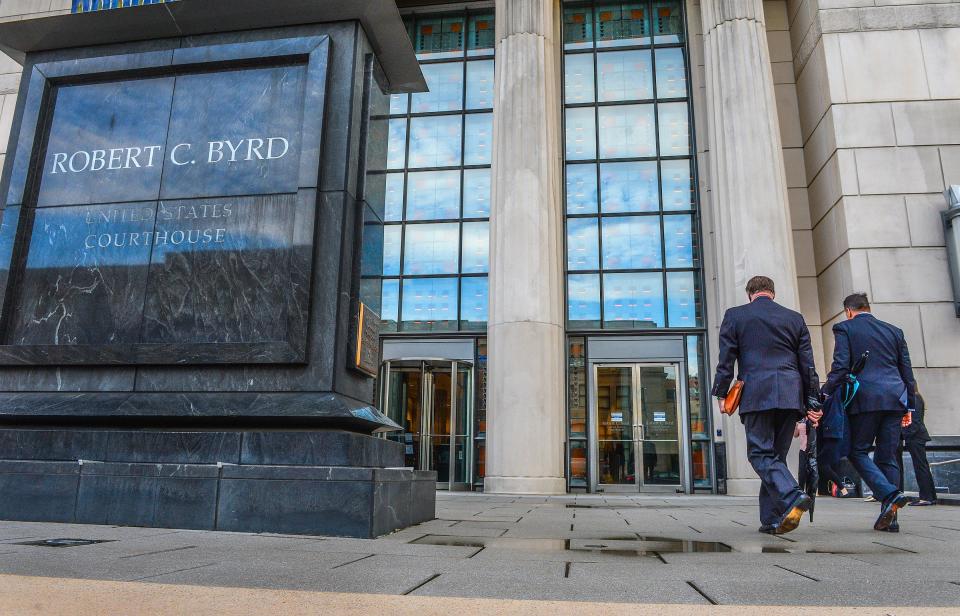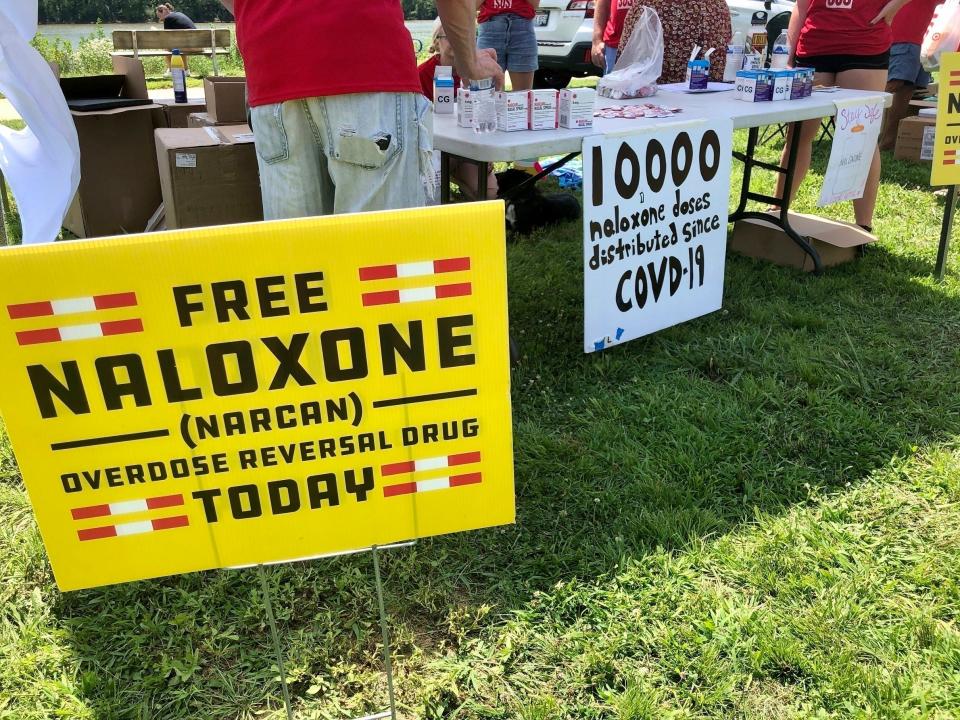Despite West Virginia ruling, pharmaceuticals face consequences in opioid epidemic
Alicia Bowman, 38, wanted to get clean from her opioid use disorder, but didn't have a place to turn.
She was in Cabell County, West Virginia – the state with the highest opioid overdoses per capita in the nation. It was January 2012. She hadn’t seen her daughter for five years and she couldn’t find help.
“Right before I got clean, I had put my name on every facility between here, Ohio, Kentucky, even some in North Carolina, and I didn't get a call back about a bed being available until I had been clean for six months,” said Bowman, who now works as a peer recovery coach at Lily’s Place, West Virginia’s only neonatal center dedicated to weaning infants born dependent on drugs.
Lily’s Place and other substance use services are at a critical need in Cabell County – where 10% of the population suffered from opioid use disorder between 2015 and 2020 – and demand quickly outpaces resources and money.
To get more money to treatment centers like Lily's Place, Cabell County and its main city of Huntington decided to take the problem to the source: pharmaceutical companies that pushed millions of opioids into the county over the last decade. Now, a federal judge ruled on July 4 that the three major pharmaceutical companies were not liable, leaving one county at the center of the opioid epidemic in the dark, without the critical resources it needs to save lives.
The verdict denied Cabell and the city of Huntington $2.5 billion it sought over 15 years to fund programs aimed at reducing overdoses and overdose deaths.

White House: As Biden administration fights opioid overdoses, harm reduction groups face opposition
No one left untouched by opioids in Cabell County
With a population around 48,000, Huntington typically sees a few overdoses each day. Nearly six years ago, however, the town drew national attention after 27 overdoses in four hours.
Angie Saunders, direct of the Prevention Empowerment Program in Huntington, said there is no one in the community that hasn't felt the effects of the opioid epidemic.
"The days of a family saying, 'Not my family,' is gone," Saunders said.
Opioid overdose rates in Cabell are 72.7 per 100,000, almost five times the national average.
Approximately 127 million painkillers were delivered by three pharmaceutical companies in the county between 2006 and 2014. That averages out to 142 pills each year for every resident.
Saunders said she'll continue doing the work to rid her community of opioids, but that losing out on the $2.5 billion "was the difference in the ending of this epidemic happening in my lifetime."
“I'm tired of watching people die,” said Greg Puckett, the county commissioner in nearby Mercer County. “I'm tired of going and working in my community only to have somebody coming around the corner screaming that they need Narcan because somebody else has overdosed in a garage around the corner.”
Huntington Mayor Steve Williams said he won’t stop until the three pharmaceutical companies are held accountable for their role in distributing opioids in his city.
“Why in God’s name should we have to pay for the garbage they dumped in our laps,” Williams said. “These guys sit in penthouse suites in Armani suits and make their corporate decisions, but they’re not any better than the back alley drug dealers. I’d throw them behind bars in a second.”
In response to the ruling, the three companies in the Cabell lawsuit – AmerisouceBergen, Cardinal Health and McKesson – said blame for the epidemic cannot fully be on the shoulders of distributors, when an increase in prescriptions written by doctors and pill quotas set by federal agents were partly at fault as well.
AmerisourceBergen Vice President of External Communications Lauren Esposito said that pharmaceutical distributors "have been asked to walk a legal and ethical tightrope between providing access to necessary medications and acting to prevent diversion of controlled substances."
Opioid settlements find success outside Cabell
While the ruling came as a shock and disappointment to the people of Cabell, legal experts said the outcome isn’t as a setback in the opioid fight, rather as an outlier in the effort to hold the the pharmaceutical industry accountable through the courts.
“If there was ever a place where the case should have been tried, it's West Virginia, the devastation that the people in that county and that city have seen is up there with the worst across the United States,” said Hunter Shkolnik, a leading attorney in opioid litigation.
Suing opioid pharmaceuticals is now a key strategy for holding companies accountable to change their methods, and to get millions in relief to local communities at ground zero of the epidemic.
This effort culminated in a $26 billion settlement, with national companies AmerisourceBergen and Cardinal Health each paying $6.4 billion, McKesson paying $7.9 billion and Johnson & Johnson paying $5 billion. Forty-six states participated in the settlement, and the money will be allocated down to local cities and counties to institute opioid addiction and prevention measures.
“A lot of people thought we were crazy," Shkolnik said. "It was hard to convince people that we could win and stop the opioid epidemic and the way they were doing business through this type of lawsuit."
He added: "The one or two losses are going to happen. It's the war that we've won"
But while similar lawsuits across the country have resulted in victories for a number of cities and counties in the past few years, drug overdose deaths reached their highest number ever recorded in a year, surpassing 100,000 in the 12-month period ending in April 2021, according to the Centers for Disease Control and Prevention.
Paul Geller, a plaintiffs' lawyer in opioid litigation who has previously represented the state of Maryland and city of San Francisco, said the epidemic today is a “perfect storm” of liability.
Drug companies “hoodwinked” doctors into believing opioids were less addictive than manufacturers knew them to be, Geller said. Distributors turned a blind eye to millions of pills in small towns across the U.S. Big chain pharmacies like CVS and Walgreens didn’t limit refills of the highly addictive prescriptions, and at each level of culpability, one blamed the other.
“The West Virginia ruling certainly doesn't change my mind about the level of responsibility these defendants hold," Geller said. "But I do think it further highlights the need to look at this crisis from a nationwide perspective.”
Most lawsuits against drug companies hinge on the argument that the companies are a public nuisance, something that gets in the way of the public good, like pollution or a health hazard. Public-nuisance arguments have been similarly applied against big tobacco and in asbestos exposure.
The public-nuisance legal argument has found success across the country, but judges have questioned or stricken down this logic in California and Oklahoma, and now in West Virginia.
Patrick McGinley, a professor at the West Virginia University College of Law, said the ambiguity around these laws can result in different outcomes across state lines.
“There's no magical formula for deciding what legal claim would work in this unusual situation," McGinley said. "We've got half a million people dead, millions more addicted, and these enormous numbers of opioid pills flooding the country, not only West Virginia."
Researchers say that lawsuits against pharmaceuticals can't be the end all, be all solution to fund treatment and harm reduction services.
Sara Whaley, a researcher at the Johns Hopkins Bloomberg School of Public Health and program manager of the Bloomberg Overdose Prevention Initiative, warned that settlement money isn't a "magic wand that's waved over this crisis and makes it go away."
Though the ruling left Cabell County empty-handed, Sen. Shelley Moore Capito, R-W.Va., said she had "a lot of respect for the judge" in the case and "respect for the judgment that he made."
But the outcome has put only more pressure on Congress to find ways of helping the communities that have been deeply affected by the crisis, and are most in need of resources to help their residents.
Along with Sen. Jeanne Shaheen, D-N.H., Capito said she's worked to secure federal money for fighting substance-use disorder to communities most affected by overdoses, to ensure hardly hit rural areas won't lose out in funding compared with populous states with more drug overdoses overall but less per capita.
Williams, the Huntington mayor, said the lawsuit's outcome won't stop local officials and nonprofits from fighting for those responsible to foot the bill – even if they will "be dealing with the fallout of the effects of opioid tablets, heroin and fentanyl for at least the next 20 to 50 years.
"If I have to go until my dying breath, I will be spending every moment of every day to make sure that our city, our state and for that matter, our nation are given the opportunity to be able to make sure that the taxpayers are not paying for the abatement of this problem."

This article originally appeared on USA TODAY: Judge sides with opioid pharmaceutical companies in West Virginia

 Yahoo Sports
Yahoo Sports 